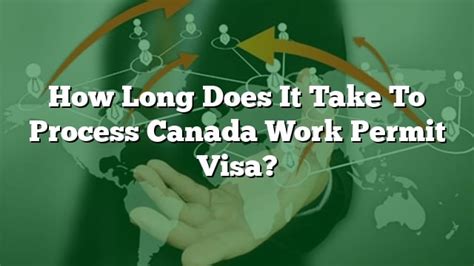The thrill of landing a new job in a foreign country! As you prepare for this exciting adventure, you may be wondering about the work permit processing time. How long does it take to get a work permit, and what can you expect during this process? In this article, we'll break down the work permit processing time, the factors that affect it, and provide valuable insights to help you plan your move.
Why is work permit processing time important?
A work permit is a crucial document that allows you to work in a foreign country. The processing time can significantly impact your plans, including your start date, relocation, and even your visa application. Understanding the processing time helps you prepare and make informed decisions about your move.
Factors affecting work permit processing time
Several factors can influence the work permit processing time, including:
- Country and jurisdiction: Processing times vary significantly depending on the country, province, or state you're applying to. Some countries have faster processing times, while others may take longer.
- Type of work permit: Different types of work permits, such as temporary or permanent, may have varying processing times.
- Application completeness: Incomplete or inaccurate applications can lead to delays or even rejection.
- Work permit quota: Some countries have limited quotas for work permits, which can impact processing times.
- Seasonal fluctuations: Processing times may be longer during peak application seasons.
Average work permit processing times
While processing times vary, here are some general guidelines on what you can expect:
- Temporary work permits: 2-6 weeks (e.g., Canada's Temporary Foreign Worker Program)
- Permanent work permits: 6-12 months (e.g., Canada's Express Entry program)
- Intra-company transfers: 2-4 weeks (e.g., the United States' L-1 visa program)
Please note that these are general estimates, and processing times can vary significantly depending on the specific country and circumstances.
Step-by-step guide to the work permit application process
To give you a better understanding of the process, here's a step-by-step guide:
- Initial application: Submit your application, including required documents and fees.
- Review and verification: The relevant authorities review your application, verify your documents, and conduct background checks.
- Admissibility assessment: Your application is assessed to ensure you meet the country's admissibility requirements.
- Work permit approval: If your application is approved, you'll receive a work permit.
- Entry to the country: You can enter the country and begin working once you have your work permit.

Tips to reduce work permit processing time
While you can't control all factors, here are some tips to help reduce processing times:
- Submit a complete application: Ensure your application is accurate and complete to avoid delays.
- Use certified documents: Use certified documents, such as birth certificates or diplomas, to avoid verification delays.
- Choose the right work permit: Select the most suitable work permit type for your situation to avoid unnecessary delays.
- Plan ahead: Apply early to account for potential delays and ensure you receive your work permit on time.
Gallery of Work Permit Processing Time






Frequently Asked Questions
How long does it take to process a work permit application?
+Processing times vary depending on the country, type of work permit, and application completeness. On average, temporary work permits take 2-6 weeks, while permanent work permits take 6-12 months.
What are the most common reasons for work permit application delays?
+Delays can occur due to incomplete applications, inaccurate documents, or high application volumes. It's essential to submit a complete application and plan ahead to avoid delays.
Can I expedite my work permit application?
+Some countries offer expedited processing options for an additional fee. However, this is not always available, and processing times can still vary.
Final Thoughts
Work permit processing time can be a significant factor in your relocation plans. Understanding the average processing times, factors that affect them, and tips to reduce delays can help you prepare and make informed decisions. By being proactive and planning ahead, you can minimize potential delays and ensure a smooth transition to your new job.
We hope this article has provided valuable insights into work permit processing times. If you have any further questions or concerns, please don't hesitate to comment below.
